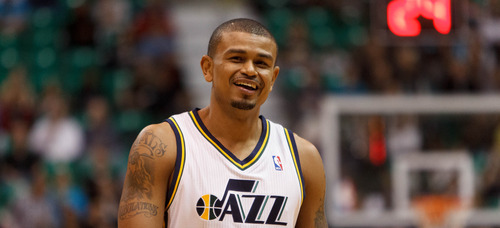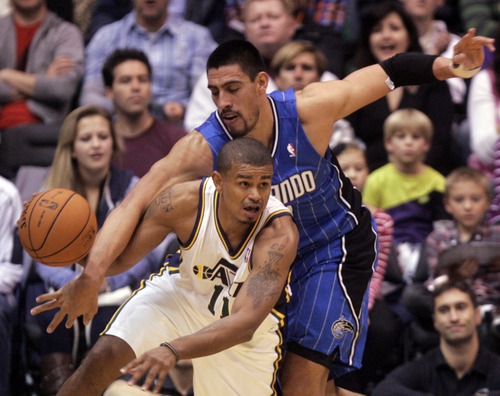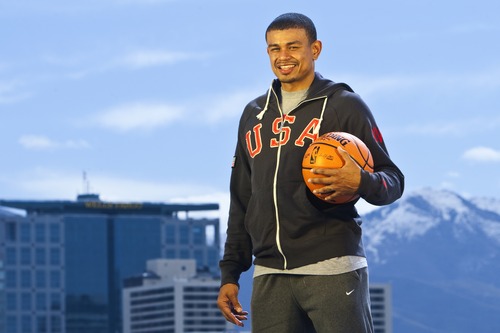This is an archived article that was published on sltrib.com in 2013, and information in the article may be outdated. It is provided only for personal research purposes and may not be reprinted.
When Earl Watson grew up in a broken neighborhood in Kansas City, he saw crime to the left of him and hopelessness to the right. When he dribbled out of it, to play basketball at UCLA, the 17-year-old point guard suddenly looked to one side and saw Magic Johnson and to the other and saw John Wooden.
And with that move, much more than his surroundings changed. Everything changed.
"Without them, and people like them," Watson says, "there would be no me."
Johnson grabbed the teenager and hauled him off to the gym almost every day to ball with an elite group of players. At first, Watson thought he was just getting in a good run. As it turned out, he was an apprentice, learning at the Converse of the master.
"I was always on Magic's team," Watson says. "He taught me the game. I played a lot of defense and made plays for everybody else. He told me, 'Don't worry about scoring points, just make your teammates better. Help your teammates believe they are better than they really are. Make the game easy for them.' "
On Sundays, every Sunday, Watson visited with Wooden at his home in Encino.
"We talked about basketball and we talked about life," he says. "He taught me about things like loyalty, telling me how he wrote letters to his wife, who was deceased, and put them in an envelope under his bed. I asked him constant questions about his championship teams, about his players. I wanted to learn. It was an opportunity of a lifetime. His ability to teach planted a seed in me, and made me want to coach."
Since that time, the seed has started to sprout. While Watson, now in his 12th NBA season and his third with the Jazz, is still playing, in a limited role, the teaching part of the game is taking over. He's played for and received additional lessons from basketball gurus such as Jerry West, Nate McMillan, Hubie Brown, Larry Bird, Dick Harter, Jack Ramsey and Jerry Sloan.
"So many amazing coaches," he says. "I've been in basketball heaven. I think I have no choice but to coach. If I didn't, it would be like somebody learning under da Vinci or Van Gogh and then deciding to do something else. It's like, 'What are you thinking?' "
Watson, then, is a coach-in-waiting.
Already, he's helped fund and coach a youth club team back in Kansas City. And on the Jazz, he spends time with his young teammates, instructing them not only about basketball's nuances, but its sweeping ideals. Stuff like thinking right, on and off the court, and being a pro's pro.
"You have to learn personalities," Watson says. "Every guy is different. For instance, I can be more direct, more vulgar in my language when I'm talking to Derrick Favors. Enes Kanter, I have to nurture him. Gordon Hayward, I have to intellectually stimulate. Jeremy Evans, you teach and nurture.
"I'm not a big fan of joking around with my teammates. I'm more serious. I keep it positive. Basketball is like life. The more you make guys feel positive, the more secure they feel about themselves, the better players they can become. I try to bring something out of younger players that they never knew existed. I try to inspire and motivate. Whatever you talk about reflects in everybody."
And Watson, himself, is a reflection of the basketball men who have guided him, the crusty guardians of the game. Not only have their attitudes stayed with him professionally, they've also become a part of his personal existence.
"Everything's old school for me," he says. "From Nat King Cole to Elvis Presley. I even love the old black-and-white TV shows. I like Turner Classic movies. I mean, who doesn't love Marilyn Monroe? What's not to love there?"
The point guard has a point.
Watson even sits and watches Shirley Temple films with his 3-year-old daughter, Isabella, who he says is an inspiration for him: "She sets high standards for me. You want to live the right way for your kids, be a light for them in the world. Just like basketball, it makes you accountable. I try to give her all the knowledge I have about everything. By the time she's 11, she'll be quoting Socrates and coach Wooden."
Maybe Isabella will become a coach one day, too, happy to pass along what her father has been happy to receive.
"I'm grateful for my life, and for everyone who has taught me so much," he says. "It's a good life. And I want to give back, to teach others what I've been taught."
Gordon Monson hosts "The Big Show" weekdays from 3-7 p.m. on 1280 and 960 AM and 97.5 FM The Zone. Twitter: @GordonMonson.







